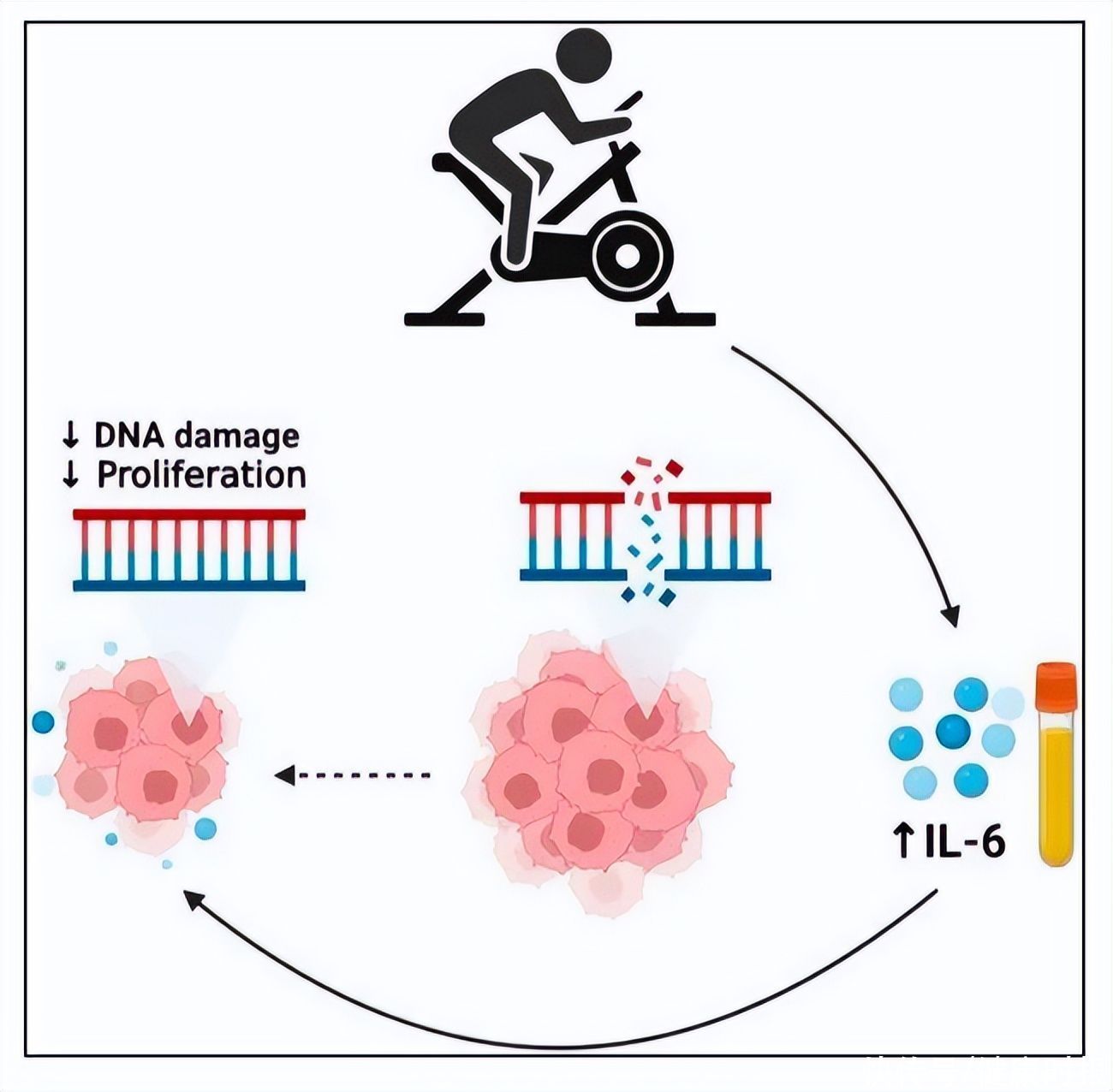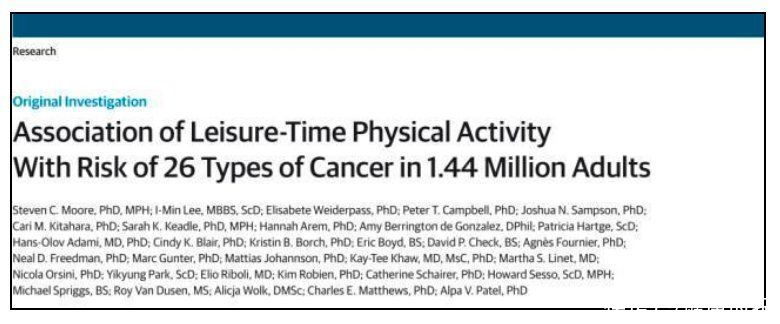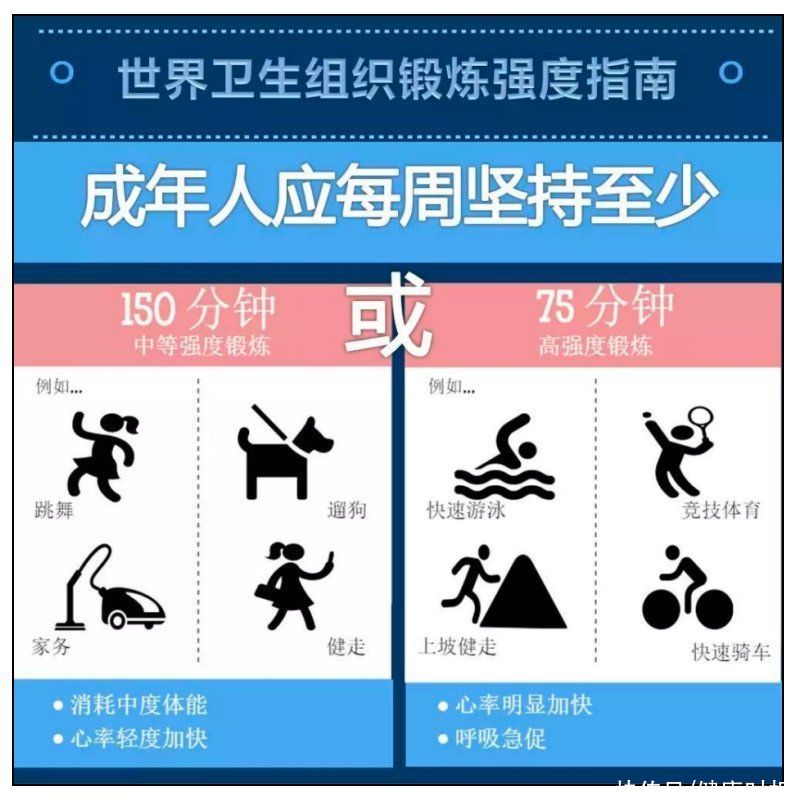In the experiences of many patients who have successfully fought cancer, many people have mentioned “exercise”! Can exercise really fight cancer? Many people do not know, and it is even difficult to say why.
However, a new study gives everyone a reason to keep exercising every day.
Exercise for 30 minutes a day will increase such “anti-cancer” components in the blood
Published in February 2022 A study in the International Journal of Cancer found that when individuals persisted in moderate-intensity aerobic exercise several times a week for a long time, the body released more cancer-fighting molecules, such as interleukin-6 (IL-6). 6), these molecules can act on abnormal cells, promote DNA repair and slow the growth of cancer cells.

The study recruited 16 50-80 year-old male volunteers with some lifestyle risk factors for bowel cancer, such as being overweight or obese.
They received a blood sample collection during the initial phase of the study. This was followed by moderate-intensity indoor cycling, which lasted 30 minutes. After the exercise, the researchers collected a second blood sample. As a control, the resting state samples were taken on the second day without exercise.
After analyzing the comparative samples, the researchers confirmed that IL-6 in the blood after exercise will increase significantly. They added the samples to colorectal cancer cells grown in the lab, and the exercised samples visibly slowed the growth of the cancer cells compared to the resting samples. ①②
Their anti-cancer experience is inseparable from exercise!
1. He Ming: He has only 3 months left in the advanced stage of lung cancer, and he ran a miracle of life with 61 marathons
In the circle of cancer patients and marathon runners, there is a very popular name – He Ming, he is also known as “horse race anti-cancer fighter”.
In 2016, He Ming was diagnosed with advanced lung cancer. The doctor told him that at most 3 months were left. That year, He Ming was only 53 years old. He didn’t want to fall down like this, and chose active treatment. After 9 months and 33 chemotherapy treatments, He Ming’s condition has not improved. Just when he was about to give up, he was determined to make a change.
As his body allowed, he began to do rehabilitation training, from walking, to jogging, to climbing. Slowly, He Ming fell in love with sports. One day, he accidentally saw an advertisement for a marathon in his city, and an impulse suddenly surged in his heart. He strongly wanted to run a marathon.

In order not to worry his family, he kept it from his family Signed up for the first half marathon, which took 2 hours and 17 minutes. After the run, he also learned about his physical condition and had more confidence to run the marathon. So, he officially embarked on the journey of the marathon.
In order to complete the marathon, He Ming took anti-cancer treatment and ran training at the same time. In 2017, he completed his first half marathon before deciding to challenge for 100 marathons. From the first full marathon to the 61st run of the Xiamen Marathon on January 5, 2020. ③
2. Zhang Lei: He was diagnosed with cancer and underwent three operations, insisted on swimming and exercise, and the cancer did not recur strong>
In 2018, a CCTV program told about a medical worker who fought against cancer for 20 years and insisted on one thing – swimming, The ultimate “healing” story.

CCTV report screenshot
Twenty years ago, Zhang Lei, who was in his 40s, was diagnosed with cancer and had to undergo three surgeries. The doctor told her politely that her life was running out of time.
Although the pain caused a huge blow to her body and mind, she refused to admit defeat and decided to “fight with cancer”, thinking of swimming that she likes , decided to go for a tour. After that, not only did the cancer not recur for more than 20 years, but also finally “cured”. ④
Exercise, an irreplaceable anti-cancer “prescription”!
1. Cancer patients: start with walking and increase exercise gradually
< span>Chen Chao, deputy director of the First Department of Surgery, Wuhan Eighth Hospital, Hubei Province, shared at the 18th member congress of Wuhan Colorectal Cancer Patient Club in 2021 that cancer patients should not participate in strenuous exercise, and walking is a better way to exercise .
At the beginning, the amount of exercise should be small, and the exercise time should not be too long, 15-20 minutes each time, and gradually increase to 30 minutes each time according to the condition and physical strength -40 minutes, it is advisable to sweat a little, and the heart rate is controlled at 50%-70% of the maximum heart rate. For example, when walking at intervals, change slow walking and fast walking every 3 minutes, do 5-10 times a day, and last about 1 hour in total. It should be carried out in parks, forests, grasslands, fields, watersides and other places with fresh air and a quiet environment, at least 3-4 times a week, and every other day. Those with strong physique will not get tired after exercise and can continue to exercise every day.
Also, 5-7pm is the best time to take a walk. During this time, the human body has a fast metabolism, the heart beat and blood pressure regulation are in the most balanced state, the body temperature is higher, the muscles are easily activated, the flexibility is better, and it is safer for exercisers. ⑤
2. Ordinary people: 150 minutes of aerobic exercise per week, long-term adherence< /p>
A study involving 1.44 million people in Europe and the United States published in the 2016 Journal of the American Medical Association of Internal Medicine found that exercise was associated with the risk of 26 different cancer types. People who exercised for a long time had significantly lower rates of at least 13 types of cancer.
Adults who exercised the most had an average 7% lower risk of cancer compared with adults who exercised the least. Those who exercised the most, who walked briskly for more than an hour a day on average, were 42 percent less likely to develop esophageal cancer, 27 percent less likely to develop liver cancer, and 23 percent less likely to develop kidney cancer. Gastric cancer, endometrial cancer and myeloid leukemia were also reduced by over 20%. Regular exercise can also reduce the risk of myeloma, colon cancer, head and neck cancer, rectal cancer, gallbladder cancer and breast cancer by 1-20%, and reduce the risk of lung cancer in smokers by 26%. ⑥

The World Health Organization recommends that adults should At least 150 minutes of moderate-intensity physical activity per week, or 75 minutes of vigorous-intensity physical activity, below this standard is considered to be physically inactive.
Moderate-intensity exercise, that is, “feeling hard but not very tired” during exercise, which is manifested in increased breathing rate and rapid heartbeat during exercise, Slight sweating, slight panting but can communicate with others, it is advisable that the heart rate does not exceed “170-age”. At the same time, it is better not to feel tired the next day. ⑦

This article is synthesized from:
① Samuel T. Orange et al, Acute aerobic exercise‐conditioned serum reduces colon cancer cell proliferation in vitro through interleukin‐6‐induced regulation of DNA damage, International Journal of Cancer (2022). DOI: 10.1002/ijc.33982
https://onlinelibrary.wiley.com/doi/10.1002/ijc.33982?af=R
② 2022-04-23 New Medical Perspective “New research finds that only 30 minutes of exercise is needed May be able to reduce the risk of cancer”
③ 2020-06-08 Surging News “He Ming, a horse-racing anti-cancer fighter, passed away unfortunately and completed 61 marathons before his death”
④ 2018- 10-17 CCTV News “65-year-old “swimmer” Zhang Lei swears by cancer twice and fights with cancer”
http://tv.cctv.com/2018/10/17/VIDEe51t1OuRqekxL5f00zek181017. shtml
⑤ 2021-10-23 Changjiang Daily Wuhan Client “Why Exercise Can Prevent Cancer? How should cancer patients exercise? Precise exercise prescription has benefited more than 8000 patients”
⑥ Steven C, et al. Association of Leisure-Time Physical Activity With Risk of 26 Types of Cancer in 1.44 Million Adults. JAMA Intern Med. 2016 Jun 1; 176(6):816-25. doi: 10.1001/jamainternmed.2016.1548.
⑦ 2018-11-27 Health Times “Effective exercise is only when the intensity reaches the standard”
Editor: Ren Xuan
Reviewer: Yang Xiaoming